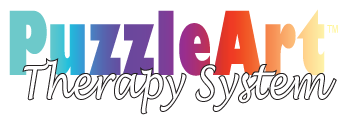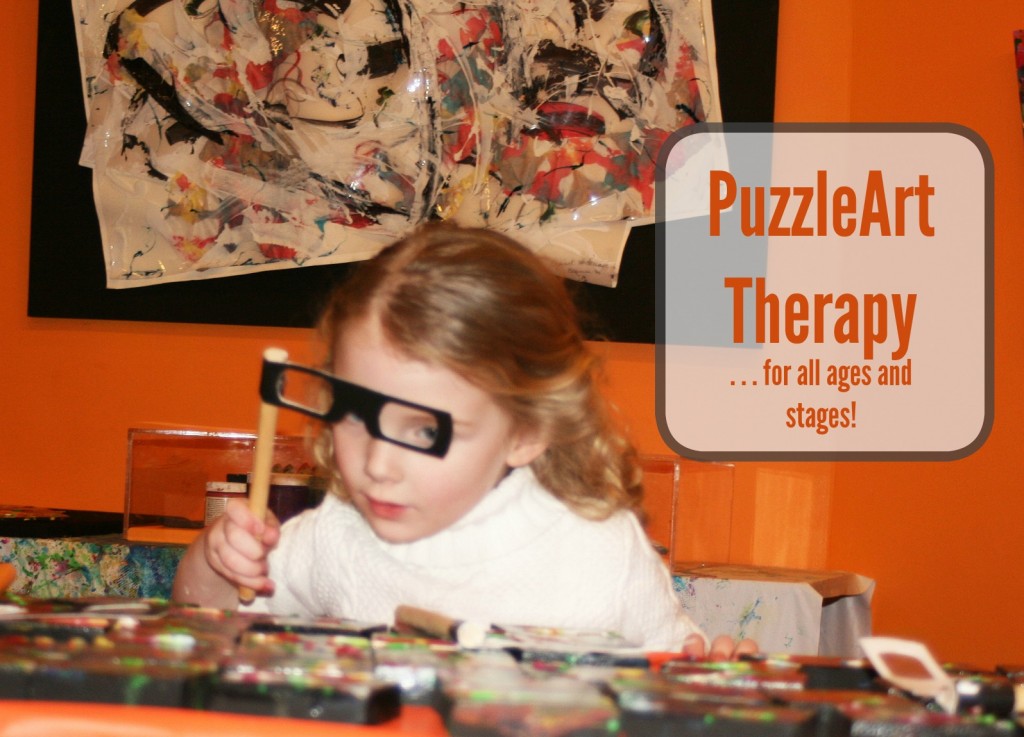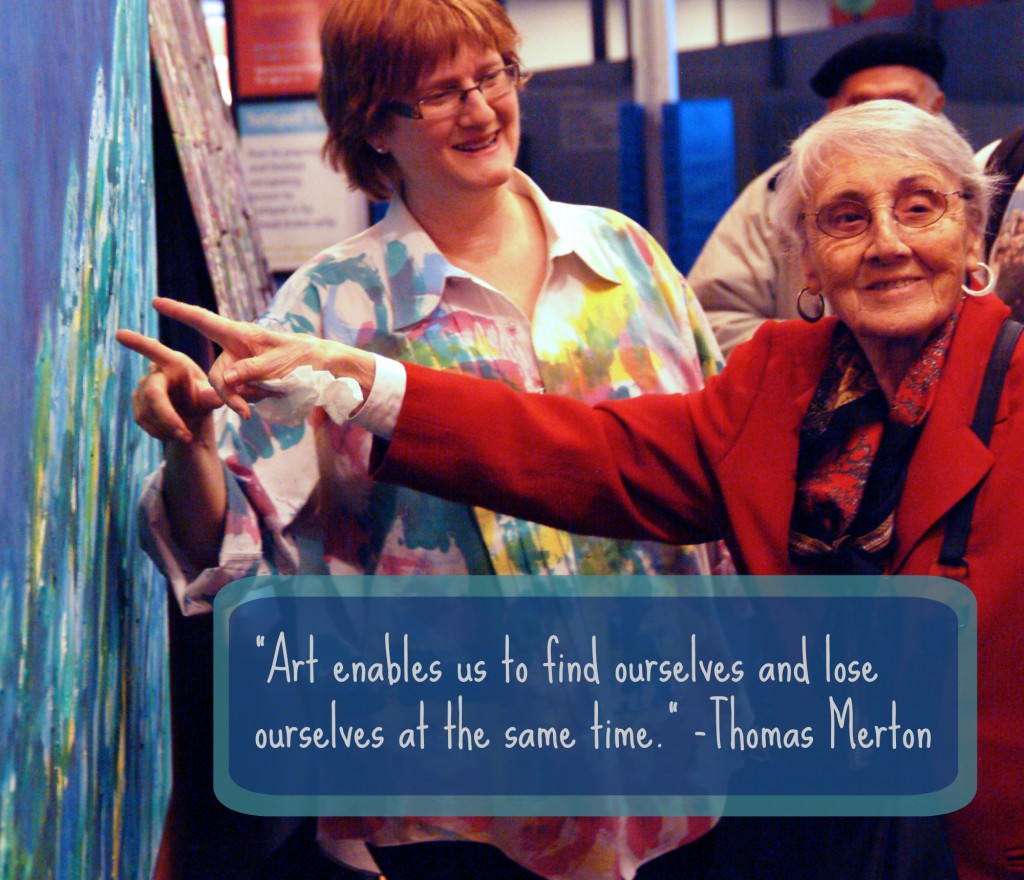Is PuzzleArt Therapy Right for Your Clients?
Through years of collaboration with neuroscientists, behavioral optometrists, anti-aging experts, educators and others, I developed the PuzzleArt Therapy system. This system uses one-of-a-kind abstract art paired with exercises that will lead your clients through new ways of thinking, seeing, processing, and creating. It encourages the body and brain to work together, developing visual perceptual skills, improving memory, encouraging neuroplasticity, and increasing communication across the corpus callosum. It's also the first therapy to combine binocular, perceptual, and sensory therapy with hands-on abstract art.
One of the most appealing aspects of PuzzleArt Therapy is that it is fun and relaxing. The phrase visual therapy has a heavy connotation to it, and in our busy lives, it's sometimes overwhelming to think about dedicating time to yet another task. But moving through the modules of Puzzle Art therapy is easy, fun, relaxing, and takes only minutes a day! Even the most reluctant of patients can be enticed to give it a try.
The versatility of PuzzleArt Therapy is also astounding. From 3 to 103, everyone can benefit in different ways, building a better brain along the way!
The College of Optometrists in Visual Development recognizes 17 skills that are necessary to succeed in reading, learning, sports, and throughout life – and PuzzleArt Therapy can help to develop and strengthen all of those areas. Those skills encompass:
- Eye Movement Control
- Simultaneous Focus at Far
- Sustaining Focus at Far
- Simultaneous Focus at Near
- Sustaining Focus at Near
- Simultaneous Alignment at Far
- Sustaining Alignment at Far
- Simultaneous Alignment at Near
- Sustaining Alignment at Near
- Central Vision (Visual Acuity)
- Peripheral Vision
- Depth Awareness
- Color Perception
- Gross Visual-Motor
- Fine Visual-Motor
- Visual Perception
- Visual Integration
While those visual skills are vital, PuzzleArt Therapy doesn't stop at just working on strengthening those competencies. The benefits are far reaching!
Children
From the preschool child to the high school student, PuzzleArt Therapy can help students succeed in and out of the classroom. Children need complex hand-eye coordination, the ability to coordinate gross motor skills and fine motor skills, and near and far focus to do close-up work as well as view teacher demonstrations or the blackboard. PuzzleArt Therapy strengthens all of those skills, and more, including:
- Bilateral Integration
- Binocular Skills
- Letter + Word Recognition
- Directionality
- Spatial Relationships
- Visual: Closure, Discrimination, Figure /Ground, Perception
In addition, children who have developed conditions such as strabismus, amblyopia, or refractive errors can benefit from the strategic visual perceptual skill builders within the PuzzleArt Therapy System.
Adults
At its most basic level, PuzzleArt Therapy is an easy, engaging, and fun method of practiced relaxation. It can have a meditative quality, which can help reduce stress, anxiety, and lower blood pressure.
Relaxation is not the only benefit, though. As your clients arrange and rearrange the pieces, they will find themselves becoming completely absorbed, making connections of line, color, shape, and texture as they work through the therapeutic modules. Tuning-in to their creativity, they will find they've tuned-out worries, concerns, and problems. But as they make new connections and see patterns and solutions that weren't immediately obvious, they may find themselves open to new solutions in other areas of their lives as well. Finding solutions to problems within the pieces can translate into improved problem solving throughout life.
Maslow is quoted as saying,
“If the only tool you have is a hammer, every problem starts to look like a nail.”
If all of your clients problems are nails, it may be time for new tools!
Of course, adults benefit from the strengthening of visual perceptual skills, as well. The PuzzleArt Therapy system can improve cognitive and problem-solving skills, strengthen memory, aid in visualization – all skills that increase productivity, decrease stress, and add to the enjoyment of life!
Keeping the brain active, engaged, and challenged is one of the major secrets to living a long and happy life – and PuzzleArt Therapy can help your clients do just that.
Special Populations
Those who have suffered a traumatic brain injury, stroke, post-traumatic stress disorder, or have a family history of Alzheimer's or dementia can benefit greatly from the skill builders that can improve memory, problem-solving skills, gross and fine motor skills, binocular skills, and bilateral integration. Improving those areas can lead to a vastly improved quality of life – and after all, it's not just the quantity of our years that matters, but the quality.
Try PuzzleArt Therapy for yourself today – just sign up here for your free brain game – that you might live younger, longer, and stronger!
Alli Berman is a Brain Fitness expert and the Eye Brain Fitness Guru. She has been an artist, author, educator, creativity consultant, workshop leader, perceptual and sensory products and programs developer, and motivational speaker for the past 30+ years. Berman has served as an educational advisor to the American Academy for Anti-Aging Medicine for over 30 years, and she is the founder of The Art of Rehabilitation and Anti-Aging Art. She created the PuzzleArt Therapy System in collaboration with behavioral optometrist, Susan Fisher, OD, and through consultation with neuroscientists around the world. Berman uses the system herself on a daily basis to keep her own brain as healthy, engaged, and challenged as possible!



PuzzleArt Therapy: Learning Through Levels - PuzzleArt Therapy
May 26, 2015 @ 3:24 pm
[…] has three levels, each with several modules that help participants learn, develop, and refine a variety of skills. The levels are set up to move the participant from simple to more complex challenges, though each […]
Reading - Avoid the Summer Slide - PuzzleArt Therapy
June 30, 2015 @ 7:51 pm
[…] simple way to make learning fun is to turn the work into a game. In the PuzzleArt Therapy System, games and fun are built-in to the very design. While the products and exercises are all enjoyable […]